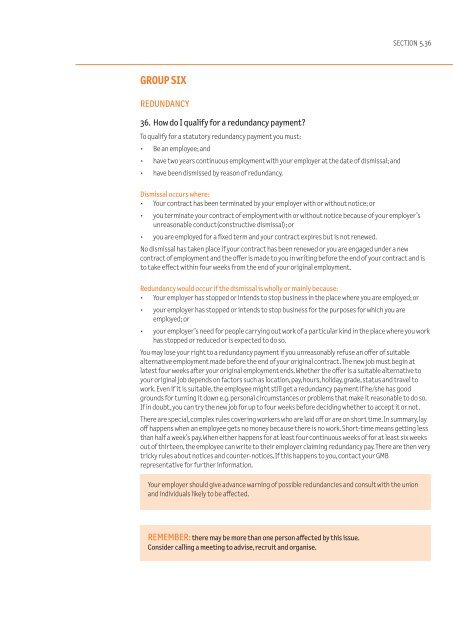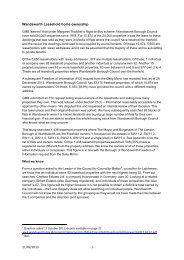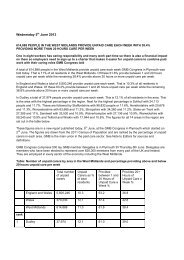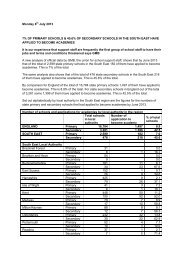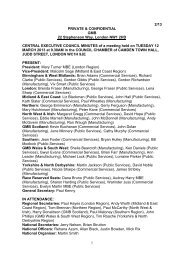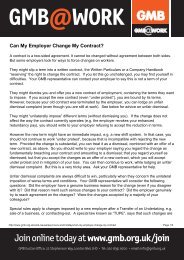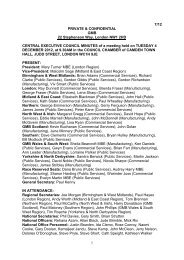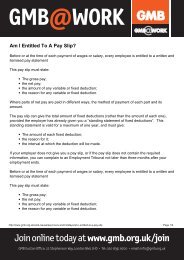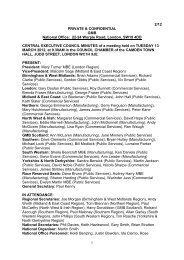WO toolkit 2012 complete.pdf - GMB
WO toolkit 2012 complete.pdf - GMB
WO toolkit 2012 complete.pdf - GMB
You also want an ePaper? Increase the reach of your titles
YUMPU automatically turns print PDFs into web optimized ePapers that Google loves.
SECTION 5.36<br />
GROUP SIX<br />
REDUNDANCY<br />
36. How do I qualify for a redundancy payment?<br />
To qualify for a statutory redundancy payment you must:<br />
• Be an employee; and<br />
• have two years continuous employment with your employer at the date of dismissal; and<br />
• have been dismissed by reason of redundancy.<br />
Dismissal occurs where:<br />
• Your contract has been terminated by your employer with or without notice; or<br />
• you terminate your contract of employment with or without notice because of your employer’s<br />
unreasonable conduct(constructive dismissal); or<br />
• you are employed for a fixed term and your contract expires but is not renewed.<br />
No dismissal has taken place if your contract has been renewed or you are engaged under a new<br />
contract of employment and the offer is made to you in writing before the end of your contract and is<br />
to take effect within four weeks from the end of your original employment.<br />
Redundancy would occur if the dismissal is wholly or mainly because:<br />
• Your employer has stopped or intends to stop business in the place where you are employed; or<br />
• your employer has stopped or intends to stop business for the purposes for which you are<br />
employed; or<br />
• your employer’s need for people carrying out work of a particular kind in the place where you work<br />
has stopped or reduced or is expected to do so.<br />
You may lose your right to a redundancy payment if you unreasonably refuse an offer of suitable<br />
alternative employment made before the end of your original contract.The new job must begin at<br />
latest four weeks after your original employment ends.Whether the offer is a suitable alternative to<br />
your original job depends on factors such as location,pay,hours,holiday,grade,status and travel to<br />
work.Even if it is suitable,the employee might still get a redundancy payment if he/she has good<br />
grounds for turning it down e.g.personal circumstances or problems that make it reasonable to do so.<br />
If in doubt,you can try the new job for up to four weeks before deciding whether to accept it or not.<br />
There are special,complex rules covering workers who are laid off or are on short time.In summary,lay<br />
off happens when an employee gets no money because there is no work.Short-time means getting less<br />
than half a week’s pay.When either happens for at least four continuous weeks of for at least six weeks<br />
out of thirteen,the employee can write to their employer claiming redundancy pay.There are then very<br />
tricky rules about notices and counter-notices.If this happens to you,contact your <strong>GMB</strong><br />
representative for further information.<br />
Your employer should give advance warning of possible redundancies and consult with the union<br />
and individuals likely to be affected.<br />
REMEMBER: there may be more than one person affected by this issue.<br />
Consider calling a meeting to advise,recruit and organise.


